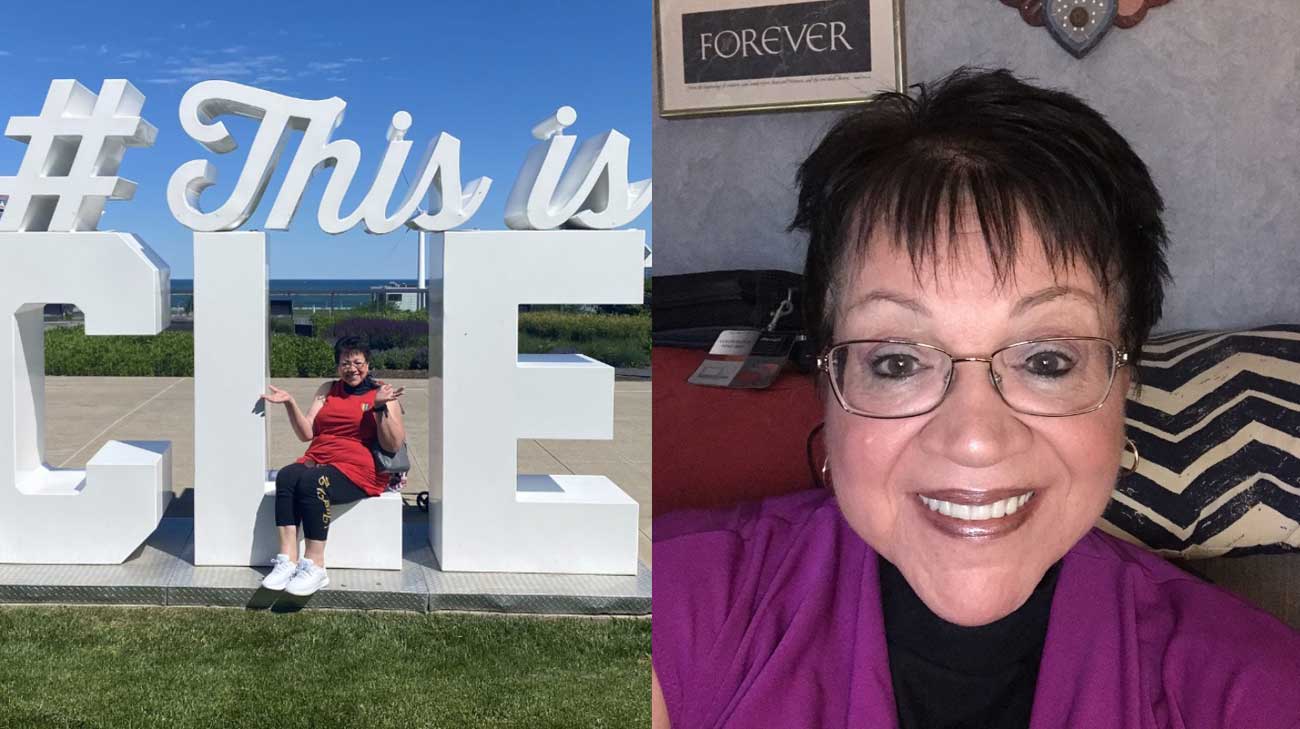
Linda Hinske was diagnosed with laryngeal cancer – cancer of your larynx or voice box – in 1997 at the age of 42.
“It all started with a horrible earache that was unbelievably painful and a little bit of raspy throat. I went to my primary care doctor because I thought I had an ear infection and maybe strep throat,” says Linda, who worked as a pre-school teacher.
After three months of different diagnoses, medications and treatment with worsening symptoms, Linda went to see an ENT (otolaryngologist or ear, nose, and throat) specialist. “He asked if he could scope me, and I said sure. When he was done, he said he was 99.9% sure I had a cancerous tumor, but a biopsy was needed to confirm it,” explains Linda.
A second opinion and biopsy later, the cancer diagnosis was confirmed. Initial treatment consisted of nine weeks of radiation treatment. But three months after completing that treatment, Linda was experiencing some pain. A follow up visit showed the cancer was back.
“My options were a partial or total laryngectomy. In my mind, there was no option. I told my doctor I preferred total because I didn’t want to give it any more ideas of trying to come back,” says Linda.
On the day of surgery, Linda’s two teenage kids, her parents, sisters, and a couple of close friends were there to offer support. “Everyone was crying, and I didn’t want that to be the last thing in my mind so as I was being wheeled out, I told the orderly to stop. I threw up my gown and flashed everyone. I left them laughing – that’s what I wanted to remember!” shares Linda.
And 14 hours later, she saw them all again.
Support before, during and after surgery
Once she was formally diagnosed with laryngeal cancer, Linda’s doctor told her about the Lost Chord Club, an organization that provides support and specialized rehabilitation to total laryngectomy patients and their families.
“I started going to meetings even before I had surgery because I wanted to see for myself that others had survived, to be with people who understood what I was going through and feeling,” says Linda.
Because she was still working, Linda went to meetings infrequently both before and after her surgery. But when she did, she noticed that those running the club were getting up in age. By the end of 2002, they announced that the club was going to shut down.
“I couldn’t let that happen. The club helped me so much. I realized I was young enough to make a commitment to keep it going, so I took over in 2003,” says Linda.
Coping with a life changing experience
“A total laryngectomy is a traumatic experience that changes a patient’s life forever,” says Beth Hohman, M.S., CCC-SLP, a Cleveland Clinic Head and Neck Institute Speech-Language Pathologist. “We are dedicated to helping patients understand this surgery and work toward their best quality of life afterward.”
The Speech-Language Pathology department at Cleveland Clinic’s main campus has a dedicated inpatient and outpatient staff that specializes in head and neck cancer. Prior to surgery, patients meet with the outpatient staff and receive extensive counseling on how their breathing, swallowing and communication will change after surgery.
Once surgery is completed, Hohman meets with the patient and their family members to continue this extensive counseling and provide education, encouragement, and advice while they recover.
“One of the most special aspects of post-laryngectomy care and counseling is when our department, with permission from the patient, arranges a visit from a member of the Lost Chord Club,” says Hohman. “Linda Hinske is that person. She has dedicated her life to helping others after total laryngectomy whether on an initial visit, or any time down the road. Linda gives every patient her contact information and tells them to reach out whenever they need to.”
According to Hohman, what makes the visits between Linda and patients special is that no matter how much a physician, nurse or speech-language pathologist knows about what a total laryngectomy is, they haven’t actually had one. They don’t know what a patient is going through.
“These patients have been through so much physically and emotionally. They need to know that life goes on after surgery, that they will heal and that there is much to look forward to,” she says. “Linda comes in, looking beautiful. She gives them more hope than I ever could by showing them she’s happy, fulfilled, communicating, eating and drinking. She communicates that what they see in her can be their future as well.”

Randy Bogart of Indiana, pictured here with Beth Hohman and Linda Hinske, is one of the nearly 1,000 patients Linda estimates she has visited following laryngectomy surgery.
Randy and his sister Jill Rager were very appreciative of Linda’s visit.
Jill stated, “I was so glad to hear her emphasize that yes, his voice will be different but he is the same valuable person he was before.”
And Randy, who is now moving forward with learning to communicate in a different way following a voice restoration procedure (trachea-esophageal puncture with a voice prosthesis placement) wrote “It was good to see all Linda has been through and how she has handled it. It was really nice, and it was good to talk with her.”
Related Institutes: Head & Neck Institute

